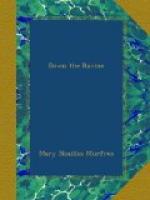There was a pause. But the luxury of being allowed to talk without contradiction or rebuke presently induced Tim to proceed.
“He war hyar mighty nigh all day long,” he said reflectively. “He eat his dinner along of we-uns.”
“Who? the Gov’nor o’ the State?” exclaimed Birt, astounded.
“Naw, ’twarn’t him,” Tim admitted somewhat reluctantly, since Birt seemed disposed to credit “we-uns” with a gubernatorial guest. “It’s the surveyor I’m talkin’ ’bout. Nate hed ter pay him three dollars an’ better fur medjurin’ the land. He tole Nate ez his land war ez steep an’ rocky a spot ez thar war in Tennessee from e-end ter e-end. He axed Nate what ailed him ter hanker ter pay taxes on sech a pack o’ bowlders an’ bresh. He ’lowed the land warn’t wuth a cent an acre.”
“What did Nate say?” asked Birt, who hung with feverish interest on every thoughtless word.
“Waal, Nate ’lows ez he hev fund a cur’ous metal on his land; he say it air gold!” Tim opened his eyes very wide, and smacked his lips, as if the word tasted good. “He ’lowed ez he needn’t hev been in sech a hurry ter enter his land, ’kase the entry-taker told it ter him ez it air the law in Tennessee ez ennybody ez finds a mine or val’able min’ral on vacant land hev got six months extry ter enter the land afore ennybody else kin, an’ ef ennybody else wants ter enter it, they hev ter gin the finder o’ the mine thirty days’ notice.”
Tim winked, an impressive demonstration but for the insufficiency of eyelashes: —
“The surveyor he misdoubted, an’ ’lowed ez gold hed never been fund in these parts. He said they fund gold in them mountings furder east ’bout twenty odd year ago—in 1831, I believe he said. He ‘lowed them mountings hain’t got no coal like our’n hev, an’ the Cumberland Mountings hain’t got no gold. An’ then in a minit he tuk ter misdoubtin’ on the t’other side o’ his mouth. He ’lowed ez Nate’s min’ral mought be gold, an’ then ag’in it moughtn’t.”
The essential difference between these two extremes has afforded scope for vacillation to more consistent men than the surveyor.
“Thar’s the grant right now, in the pocket o’ Nate’s coat,” said Tim, shifting the garment on his arm to show a stiff, white folded paper sticking out of the breast pocket. “I reckon when he tole me ter tote his gun an’ coat home, he furgot the grant war in his pocket, ‘kase he fairly dotes on it, an’ won’t trest it out’n his sight.”
Nate was in the habit of exacting similar services from his acquiescent younger brother, and Tim had his hands full, as he tried to hold the gun, and turn the coat on his arm. He finally hung the garment on a peg in the shed, and shouldered the weapon. Suddenly he whirled around toward Rufe, who was still standing by.
“What in the nation air inside o’ that thar boy?” he exclaimed. “A chicken, ain’t it?”
For a musical treble chirping was heard proceeding apparently from Rufe’s pocket. This chicken differed from others that Rufe had put away, in being alive and hearty.




